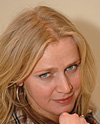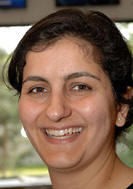Five hours at Tel Aviv airport
Diary from the Middle East (1)
What does daily life look like in Israel and the
Palestinian territory? Two editors of the Arabic desk of Radio
Netherlands Worldwide, Nicolien den Boer and Abir Sarras, will be -
separately - travelling through the region in the coming weeks.
Their trip coincides with the 60th anniversary of the state of
Israel and the commemoration of the naqba (catastrophe) for the
Palestinians. They are keeping a travel diary.
(edited
translation of the original Dutch report by Nicolien den Boer)
********
When the Israeli woman who's interrogating me at Tel Aviv airport says, "I've just sent someone back who didn't co-operate", what she actually means is "you've been warned". It's 4 a.m., and this is the third time I've been questioned so far. I'm trying to stay calm. I haven't slept yet and I haven't had anything to drink for hours. The woman, probably a member of the Israeli security services, points me to the water fountain outside the toilets. I rinse my mouth, nothing more (is it safe to drink the water here?).
My passport has stamps from various Arab countries: Dubai, Yemen and archenemy Syria. After having to explain away all the telephone numbers I have in my possession, give my e-mail address and provide information about all my planned visits to the West Bank and the Gaza Strip, there yet another interrogation of about an hour followed, this time about my time in Syria: "What did you do there?" "Do you know anyone there?", "Where exactly did you go?".
Finally, after more than five hours of waiting and being questioned at Tel Aviv airport, I get my passport back and am allowed to go. My suitcase is waiting, but - despite what I was promised - there's no one keeping an eye on it.
Confused
On the way to my hotel, I am feeling rather confused. I thought the Israelis always laid out the red carpet for members of the Western press. Haven't they got a reputation for bending over backwards to help journalists, handing out beautiful press packs and great quotes? If they treat me, a Dutch woman like this, what's it like for a Palestinian? I'd started going on about getting the Dutch embassy involved. I even rang them up - they were closed, of course. But a Palestinian wouldn't have any embassy to call. I'm trying not to think in simplistic terms of ‘good guy, bad guy', but it's difficult.
So I save my complaint for the government press office in Jerusalem, where I go to pick up my press card next day. "Security measures," is the explanation I get from the press officer, a tired looking woman by the name of Pnina Aizenman. "What do you think it's like for us, waking up each morning and never knowing what the day will bring?" she says, clearly referring to Palestinian suicide attacks on Israeli civilians.
Wrecked
While Pnina's busy getting my press card ready, I take a look at the photos of children and a newspaper article on the wall behind me. The article is about a woman who lost her mother and her five-year-old child in a Palestinian suicide bombing. The name of the woman is Pnina Aizenman. I get the shivers. "That's you," I stammer. "Yes. Do you understand now what I mean by security measures?" she replies. I suddenly feel ashamed that I've just been complaining about being kept waiting for five hours when this woman's life has been totally wrecked by a bomb.
Then I also remember the bread roll that a
police officer offered me at the airport, and that one of the women
questioning me told me about the death of two friends and how she
dedicated her work to their memory and did it "to defend her
country". Totally confused, I leave the press office and walk out
onto the streets of Jerusalem. Suddenly I find that I've totally
binned that ‘good guy, bad guy' thing I had in my head less than 24
hours ago.
* RNW translation (mw)




